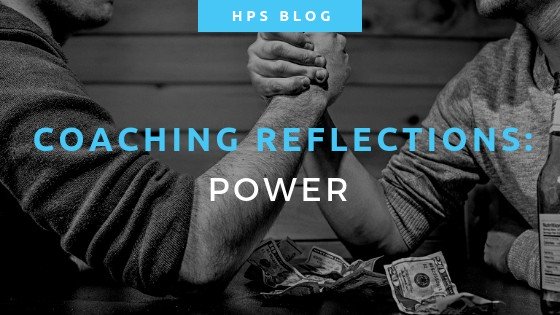Coaching Reflections – Power

“Power tends to corrupt, and absolute power corrupts absolutely.”
This quote by Lord Acton is a commonly expressed idiom that is referenced when talking about attaining and wielding power.
What is less commonly expressed, however, is what happens when leadership gives away such power. So let’s deviate from this popular discussion and examine how giving away power can actually help to build leadership within a dynamic.
That’s right – I am suggesting that giving away power is critical to building leadership and engagement. Let’s examine this concept together.
________
As of late, I have been working with some very strong character-types, and observing their mercurial tracings of leadership with their teams, peers and families. During these interactions, I have heard stories of struggles, frustration, domination, moments of weakness, and even confoundedness arising from the waxing and waning of control.
When coaching the topic, what I am discovering is the lack of emotional intelligence (EQ) and a deep understanding on how to wield power. The concept of power can be as varied as it is ubiquitous – so let me outline my equation of power:
POWER = Influence + Responsibility /Accountability
Defining these terms should give you some clarity around my theory.
Power – the capacity to move an outcome in a particular way. How do you change the will of others toward your vision, using your mission and tactics?
Influence – the ability to have an effect on someone’s behaviour. Can you change their disposition, decisions, or opinions?
Responsibility – the duty of control over something or someone. When do you make a decision to act, what measurement of action should you take?
Accountability – the ownership of an action or outcome created by you. When would you put your hand up and say “it was me?”.
Let’s test the equation with two scenarios.
Scenario 1: The Manager of your work unit comes to the weekly meeting after two weeks out of the office and begins the meeting with a statement “ I have just come back and reviewed the sales figures for the month and you are well down on target. I told the Sales Director that you will have a resolution within the next two weeks. Seeing we are half way into the month I am guessing you will need to keep this meeting short and get back to your sales campaigns.” Shortly after this talk, they leave the meeting.
Influence here is very high as they have used the Director as leverage; responsibility is a premium and placed on the team to deliver in two weeks; accountability here is very low as it is mostly placed on the team and only some reporting back to the Director via the manager. In the scenario the power rests almost completely with the manager. This is a tough environment to work in and even harder to control the engagement of the team.
Scenario 2: The Manager joins a weekly meeting after two weeks out of office and begins the meeting with a request “ Hello, how are you? Are we all going ok today? As you may know, I have just returned from leave and the Director has advised me our sales targets are down for the month. As you may know I always say that the back story is equally as important as the metric, so help me understand the situation and we can then work on ways to improve the outcome together. I will then take this plan to the Director to show we are working to meet target”
Influence is high as they are using the Director and their own leadership as motivators, responsibility is shared between the team and the manager; accountability is high for the manager as they are the representative for the team and the plan and has given a commitment to return to target. Power is lower here but is shared amongst the team, in effect it is being given away to others to affect a positive outcome.
It’s all in the language
Here the change is the syntax of the conversation, it’s a conversation versus a directive and the discussion centres around questioning. For me this is the essence of sharing power, using questions to build appreciative inquiry and therefore move the will of others towards your vision. Questions shift the power dynamic away from yourself without necessarily diminishing your mission or tactics. What is a likely outcome is a strengthening of your vision as people work with you to find ways of achievement through mission.
Release of Power is Cathartic
Liken a power shift to donating your favourite jacket to charity, or lending your car to a friend for the weekend. These items have value to you and form part of your locus of power. Handing it over to someone temporarily or even permanently means that the power is shifting to others. What it will feel like is discomfort, initially, but will be replaced with a feeling of well-being, especially after your car returns in the same condition as you leant it. Hopefully this positive reinforcement will lead you to repeat the exercise.
Remember: All power is fleeting
I will leave you with this final point to ponder. You don’t own the power you currently wield. It rises and falls throughout your life and will always move toward the lowest form of entropy. This means you can’t take it with you. I will give you a parting example, I held a discussion with a colleague recently and they were relaying the fact that when they come home from work at end of day the household moves on around them. When trying to hold a conversation with their partner the conversation is often interrupted by frequent needs of others competing for the partners attentions. My colleague was relaying this with frustration and made the closing statement of “this would never happen at work, I wouldn’t allow it!”. For this colleague, so used to holding power at work, holding so little at home is worrying. The answer here may be to realise that power is handed over at the front gate and that’s OK.
How do you manage power? Do you understand how much of it you have? How much would you be prepared to give up for the sake of achieving your vision?
If you find this topic interesting or wish to discuss how you can quantify and manage your own power, reach out for a personalised discussion.
About the author
Peter is the founder and Director of Holtmann Professional Services, a global provider of executive coaching, business excellence consulting and career path development. Peter has 20 years of experience in executive roles and has been the President and CEO of a global Non-profit. Peter has written for many journals and blogs, is a keynote speaker and is a champion of prosperity through excellence of leadership.
If you are interested in working with Peter, please reach out to enquiries@holtmann.com.au.







